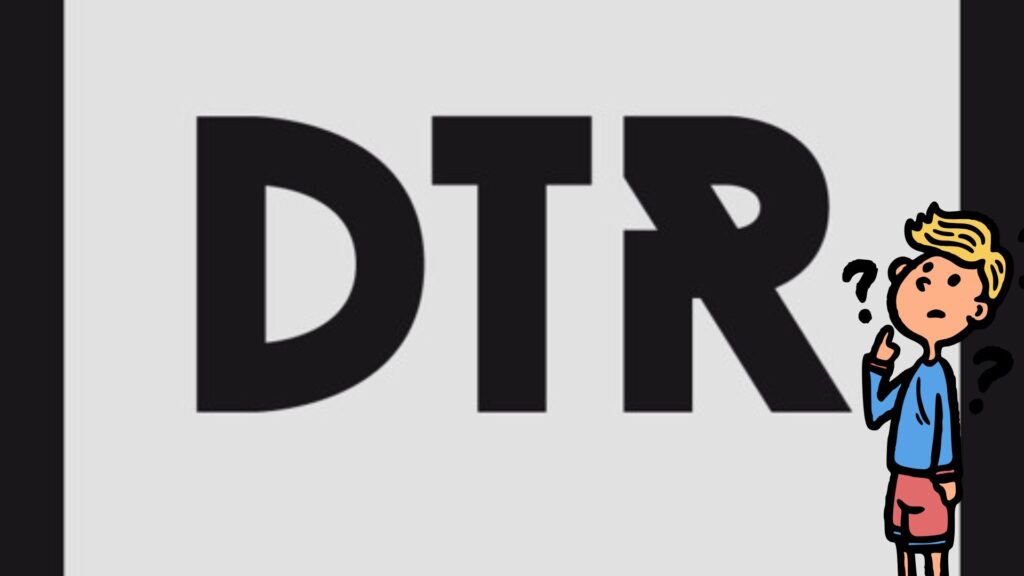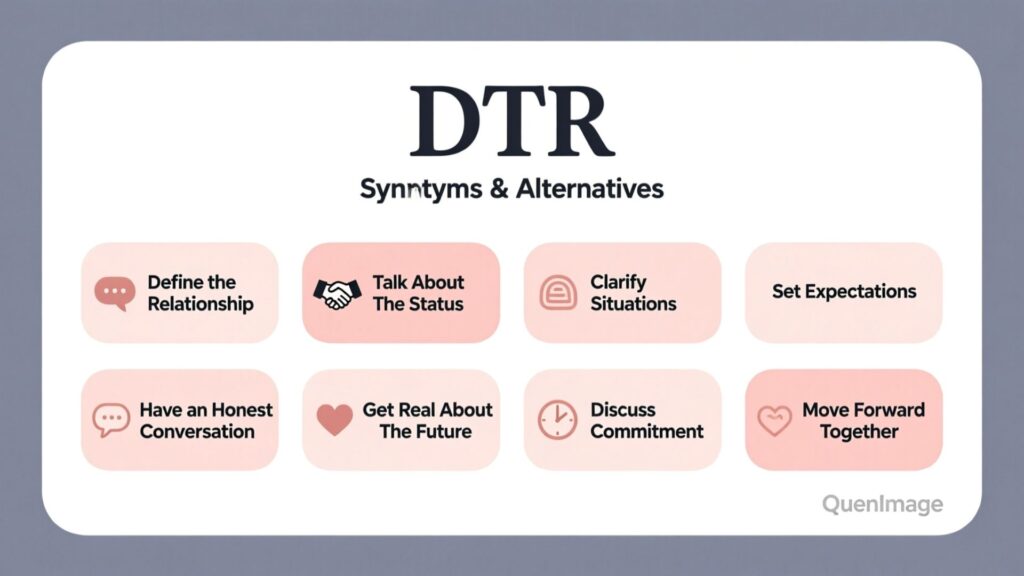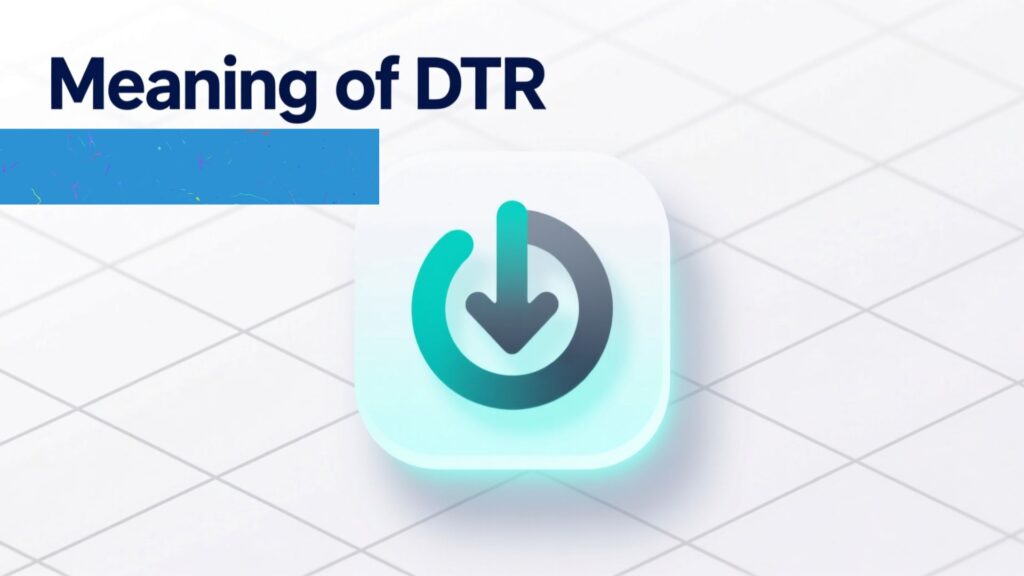In today’s fast-paced world of texting, dating apps, and casual conversations, certain acronyms carry more emotional weight than others. One of them is DTR. You’ve probably seen it pop up in a message or social media post and wondered, “What does DTR mean?”
This tiny three-letter phrase has become a big deal, especially in modern relationships where defining what you are or aren’t can make or break a connection. Whether it’s a new romance, a long-term partnership, or even a professional collaboration, DTR has evolved into a cultural shorthand for clarity.
Let’s unpack DTR meaning, explore where it came from, how it’s used in text and dating, and why this little acronym says so much about communication today.
What Does DTR Stand For?

DTR stands for “Define The Relationship.”
It’s a direct yet emotionally charged phrase that signals a crucial conversation when two people decide to clarify the nature of their connection. In plain words, it means asking, “So, what are we?”
At its core, DTR refers to the point where ambiguity ends and definitions begin. It’s the talk that decides whether you’re just hanging out, exclusively dating, or officially in a relationship.
A Quick Look at Its Origin
The term “Define The Relationship” originated in American dating culture, especially within religious and college communities during the early 2000s. Over time, as social media and texting became dominant communication tools, it was shortened to DTR to make those serious talks less intimidating or at least quicker to type.
In the world of digital slang, DTR joined the ranks of abbreviations like FWB (Friends With Benefits), BAE (Before Anyone Else), and LDR (Long Distance Relationship), each capturing complex emotional scenarios in bite-sized form.
Evolution and Cultural Context of DTR
The DTR talk isn’t new, but the way people approach it has changed dramatically.
In the past, relationships followed predictable patterns dating, commitment, engagement, marriage. Today, the lines blur. There are situationships, slow burns, ghosting, and casual dating, each with its own rules and gray areas. That’s why DTR meaning has become more relevant than ever.
From Church Groups to TikTok
Interestingly, the phrase “Define the Relationship” first became popular among Christian youth groups in the 2000s. Many young couples used it to discuss boundaries and intentions without ambiguity. But as pop culture evolved, DTR spilled into mainstream conversations.
Now, it’s just as likely to appear in a Tinder bio as in a meme or a podcast title. On TikTok, videos tagged #DTR often show users nervously preparing for “the talk” or joking about avoiding it altogether.
Generational Differences
- Millennials see DTR as a sign of emotional maturity a step toward commitment.
- Gen Z, however, views it more playfully. For them, it’s less about labels and more about mutual understanding.
- Older generations may find the term modern but appreciate its underlying message: clarity.
The tone of DTR changes depending on the culture too. In Western dating, it’s a private but expected discussion. In collectivist cultures, it might happen later after meeting family or mutual friends.
How DTR Is Used in Text and Conversations
If you’ve ever gotten a message like, “We should DTR soon,” you know that mix of excitement and panic it brings.
DTR in text usually appears when someone feels uncertain about where things are heading. It might be casual or serious, depending on tone, punctuation, and context.
Common Scenarios Where DTR Appears
- Early Dating Stage – When you’ve gone on several dates and wonder if it’s exclusive.
- Long-Term Relationship – When you’re deciding about engagement or living together.
- Friendship with Flirtation – When blurred lines create confusion.
- Post-Breakup Reconnections – When two exes reconsider their status.
- Professional Boundaries – Occasionally, “DTR” can even appear in workplace slang, referring to clarifying partnership roles.
Examples of DTR in Text Conversations
| Text Message | Tone | Possible Interpretation |
|---|---|---|
| “We need to DTR.” | Serious | It’s time to clarify what we are. |
| “Wanna DTR tonight? 😅” | Playful | Nervous but lighthearted approach. |
| “So… are we gonna DTR or keep pretending?” | Sarcastic | Hiding discomfort with humor. |
| “Let’s DTR and make it official 💕” | Romantic | Ready for commitment. |
| “Can we DTR about our collab?” | Professional | Clarifying roles or expectations. |
Texting has made DTR less formal and more spontaneous. Emojis, punctuation, and even timing can completely change its meaning.
Synonyms and Alternatives to DTR

Not everyone loves acronyms. Some prefer plain speech or softer phrasing. Depending on the situation, there are plenty of ways to express DTR meaning without actually saying “DTR.”
Polite Alternatives
These work best when you want to sound thoughtful or emotionally aware:
- “I’d like to talk about where we stand.”
- “Can we discuss what this is for both of us?”
- “I want to understand what we’re doing here.”
- “Let’s get on the same page about us.”
Professional Alternatives
When DTR moves beyond dating into business or teamwork:
- “Let’s clarify our roles moving forward.”
- “We should outline our partnership expectations.”
- “It’s time to define our working relationship.”
Casual Alternatives
These sound more relaxed and are common in texts or lighthearted chats:
- “So… are we official yet?”
- “What’s our vibe right now?”
- “Are we more than just hanging out?”
- “Make it Instagram official?”
Each variation carries a different tone. Choosing the right one depends on timing, trust, and your communication style.
Choosing the Right Version for the Right Moment
The art of the DTR conversation lies in timing and tone. Bring it up too soon, and it might feel forced. Wait too long, and it can cause anxiety or resentment.
Here’s how to decide when to initiate it and how to tailor your approach.
When to Have the Talk
- You’re wondering if you’re exclusive.
- You’ve introduced them to friends or family.
- You’re emotionally attached and want clarity.
- You notice mixed signals.
- You’re investing time and energy and need mutual understanding.
Checklist: Is It Time to DTR?
| Question | If You Answer “Yes”… |
|---|---|
| Do you feel emotionally invested? | Time to clarify expectations. |
| Are you confused about your status? | Have the DTR talk. |
| Are you thinking long-term? | Discuss it openly. |
| Is the uncertainty causing stress? | Bring it up kindly. |
Tone Tips
- Stay calm and genuine.
- Avoid ultimatums like “We need to DTR or I’m done.”
- Use humor if appropriate to ease tension.
- Focus on how you feel, not what they’re doing wrong.
As one relationship coach puts it, “DTR talks don’t have to be dramatic they just need to be honest.”
15 Real Examples of DTR and Its Alternatives in Sentences
Here are some real-life ways people use DTR and similar phrases in conversation or text:
- “It’s been great getting to know you. Maybe it’s time to DTR?”
- “We should probably define the relationship before things get messy.”
- “So, what are we? Just friends or something more?”
- “Wanna make this official?”
- “We’ve been dating for months it’s DTR time.”
- “I think we need to have that talk.”
- “No pressure, but I’d like to know where we stand.”
- “Everyone keeps asking if we’re dating. Maybe it’s time we DTR.”
- “Let’s DTR before we plan that trip.”
- “I like what we have, but I need to know if we’re on the same page.”
- “Let’s DTR, but no stress just clarity.”
- “Do you see us as something serious?”
- “We need to DTR soon before misunderstandings happen.”
- “I’m not asking for a label, just clarity.”
- “I’m ready to DTR and move forward together.”
These examples show the flexibility of the term—it can be sweet, awkward, assertive, or even funny.
The Psychology Behind DTR Conversations
Why do people dread the DTR talk? Because it mixes vulnerability and uncertainty. You’re putting your feelings on the table without knowing how the other person will respond.
Still, psychologists argue that defining the relationship creates emotional safety. Without clarity, assumptions grow, leading to misunderstandings and heartbreak.
Why People Avoid DTR
- Fear of rejection – Worrying the other person doesn’t feel the same.
- Attachment anxiety – Wanting reassurance but fearing loss.
- Desire for freedom – Preferring ambiguity to commitment.
- Ego protection – Avoiding vulnerability.
Why People Seek DTR
- Emotional security – Knowing where you stand reduces stress.
- Planning for the future – Setting expectations helps avoid mismatched goals.
- Authenticity – Being honest about feelings feels empowering.
A study by dating psychologist Dr. Helen Fisher found that 74% of adults value clarity in relationships more than spontaneity. That statistic alone shows how deeply modern daters crave transparency.
Understanding Tone and Nuance in DTR

Tone can make or break how your DTR message is received. The same words can feel warm or cold depending on delivery.
Comparing Tone Examples
| Sentence | Tone | Vibe |
|---|---|---|
| “We need to DTR.” | Serious | Could feel like an ultimatum. |
| “So… are we gonna DTR or just vibe forever? 😅” | Playful | Light, non-threatening. |
| “Let’s DTR soon. I like you and want clarity.” | Honest | Open and respectful. |
| “DTR? Lol, we’re practically married already.” | Humorous | Used to deflect or joke. |
Cultural and Gender Nuances
Research shows that men tend to delay DTR talks, often waiting for cues, while women typically initiate them earlier. But these patterns are changing fast as younger generations embrace open communication.
Culturally, some societies prefer implicit understanding over explicit labeling. In others, having a DTR talk early signals maturity and respect.
Tone, timing, and context are everything. Choose empathy over pressure.
Why Defining the Relationship Matters
Defining a relationship isn’t about control it’s about connection. When two people communicate clearly, they avoid assumptions, jealousy, and disappointment.
Key Benefits
- Emotional clarity: Both partners know where they stand.
- Reduced anxiety: No second-guessing texts or intentions.
- Healthy boundaries: Expectations are set early.
- Mutual respect: Honest conversations show maturity.
As relationship expert Esther Perel puts it, “Clarity doesn’t kill romance. Confusion does.”
In a world where ghosting and breadcrumbing have become common, having a DTR talk is an act of courage.
Common Misunderstandings and Misuses of DTR
Because DTR sounds casual, it sometimes gets misused. Let’s clear up the most frequent misconceptions.
1. DTR Means You’re Demanding Commitment
Not true. DTR simply means defining what the relationship is not forcing it to change. You could DTR and still decide to stay casual.
2. DTR Should Always Be Serious
Wrong again. Tone depends on context. A lighthearted DTR talk can be just as meaningful as a heavy one.
3. DTR Happens Only in Dating
Actually, people use DTR in friendships and work partnerships too. It’s about definition, not romance.
4. You Can’t DTR Over Text
You absolutely can. In fact, many people prefer it it’s less intimidating and allows time to think before responding.
5. Once You DTR, It’s Final
Relationships evolve. DTR is not a one-time event it’s a checkpoint. Revisit it as feelings and circumstances change.
FAQs About DTR
What does DTR mean in text?
It means “Define The Relationship.” When used in messages, it’s shorthand for clarifying romantic or emotional status.
What does DTR mean in dating?
It’s a moment when two people openly discuss what they are exclusive, casual, or something in between.
Is DTR always romantic?
Not always. It can apply to friendships, collaborations, or partnerships that need definition.
Can you DTR online or over text?
Yes. Many couples start digitally, so it’s natural for the conversation to happen that way.
When should you DTR?
When uncertainty causes emotional tension or confusion. There’s no fixed time it depends on emotional readiness.
What if the other person avoids the DTR talk?
That’s already an answer. Avoidance signals hesitation or lack of commitment. You deserve clarity.
Summary and Key Takeaways
The acronym DTR Define The Relationship captures one of the most important conversations in modern communication. Whether it’s said out loud or typed in a text, it represents honesty, vulnerability, and maturity.
Quick Recap
| Aspect | Meaning/Insight |
|---|---|
| DTR Meaning | Define The Relationship |
| Purpose | To clarify relationship status |
| Common Contexts | Dating, friendships, partnerships |
| Tone Options | Serious, playful, professional |
| Best Practices | Be honest, kind, and direct |
| Benefits | Clarity, trust, emotional stability |
Defining relationships isn’t about locking someone in it’s about freeing both people from confusion. When you DTR, you’re not just labeling something; you’re choosing to communicate like an adult in a digital world that often avoids real talk.
So the next time you see someone type, “We need to DTR,” don’t panic. Take a deep breath, smile, and remember it’s not the end of the story. It’s the start of understanding.
Bugti is the founder of Quoethint.com, a hub for English language tips, writing advice, and grammar guidance. With years of experience in English studies and a passion for clear communication, Bugti created this platform to make grammar and writing easy to understand for everyone.
